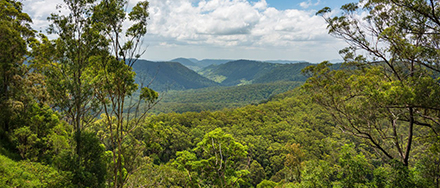
The peak forestry body in New South Wales says the election of the Coalition Government has removed the threat from the proposed new koala national park but much work remains to be done. Timber NSW General Manager Maree McCaskill said the proposed Great Koala National Park in northern NSW was now “not in prospect” for the next four years. Source: Philip Hopkins for Timberbiz
This would give time to better inform the public that forestry was not a threat to the koala’s survival, she said, as the campaign showed that many people mistakenly thought koalas were about to become extinct.
The GKNP would create a national park in the north-east forest between Wauchope and Coffs Harbour. Wauchope is the location of Timbertown, a popular heritage park inspired by the logging industry that formed the basis of the town’s early economy and prosperity.
Industry says the park would destroy the North Coast’s forest industries that employ about 4000 people and contribute hundreds of millions of dollars to the region’s economy.
A NSW Department of Primary Industries project, which focussed on koalas’ response to timber harvesting, involved acoustic technology to gain a more accurate estimate of the population and range of koalas.
The department said the project found that past timber harvesting did not influence koala occupancy. There was no difference in results between heavily harvested, lightly harvested and old growth sites.
“Time since harvesting and the amount of harvesting in the local area did not influence occupancy,” said the DPI’s Dr Brad Law. “There was also no difference between National Park and state forest sites.”
Ms McCaskill said with the Coalition able to govern with a majority, there were still unfinished business to do in the forest industry. A key area was tidying up the wood supply agreements.
Many hardwood mills had agreements only until 2023, some finished in 2027 whereas Boral’s agreement expired in 2028.
“This has created an inequity in hardwood sawmilling. There needs to be a review of the wood supply agreements,” she said.
However, the new 20-year Regional Forest Agreements, completed last year, were
“a done deal”. The RFAs’ sustainable yield is for 340,000 cubic metres of quality saw logs and more than one million cubic meters of lower quality logs.
Ms McCaskill said another issue was the State Environmental Planning Policy (SEPP), which was only introduced last year. This policy had an impact on private native forestry, where landowners with plans to use the forest had to put in a development application, even for something as trivial as clearing a fence line, she said.
Ms McCaskill said the industry needed to better inform the public about what it does and how it operates. An education campaign was needed as the public operated in a “vacuum of knowledge” about the industry, she said.
People believed the forest was clear-felled and left empty, did not understand the difference between native forestry and plantations, and did not like plantations as they were “monocultures and lacked biodiversity”.






